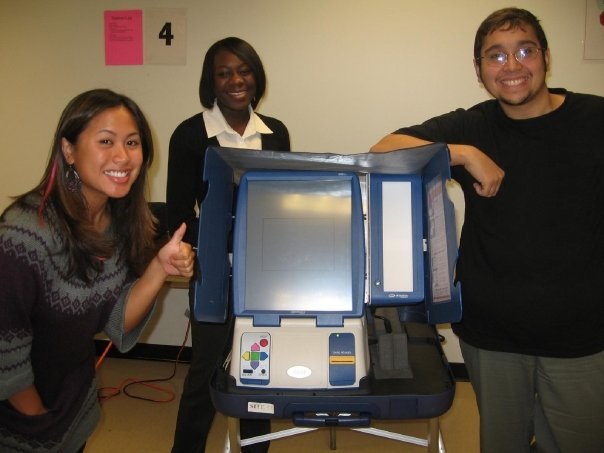The Chicago Board of Election Commissioners Uses Partnerships to Recruit Young Poll Workers
This story was featured in our ELECTricity newsletter in October 2015. Sign up to receive more success stories from election offices across the country. And how is your election office using technology to run excellent elections? Tell us about it by emailing [email protected] — we’d love to share your story!
Chicago is a city of big shoulders, deep-dish pizza, and buildings that scrape the sky. Chicago has 1.42 million registered voters and 2,069 Election Day polling places. To staff a general election, the Chicago Board of Election Commissioners hires over 14,000 poll workers.

In this month’s newsletter we highlight the Board’s community partnerships that benefit local students, the election office, and Chicago voters. Learn about how they recruit student poll workers who can troubleshoot technology and offer language assistance on Election Day.
The Chairman’s Greatest Source of Pride
“Chicago leads the nation with the number [about 4,000] of young people staffing our polling places every single election. No other jurisdiction even comes close,” said Chicago Election Board Chairman Langdon D. Neal. “The benefits far outweigh any costs.”
“Overall, our student judges have demonstrated technological savvy. That means fewer calls for technicians on Election Day. That means faster results reporting on Election Night,” Neal said. “In most elections, we have results reported from more than 90% of our precincts before the 10:00 news.”
“There’s another benefit: being fully staffed. Many jurisdictions scramble to recruit and train poll workers,” Neal said. “Election officials across the country ask us how we do it. It’s simple. We partner with Mikva Challenge and with all of the history and social studies teachers in our high schools.”
“Most important is what this means for the long-term health of the franchise. There is no better lesson in democracy than managing a polling place,” Neal said. “I often say we’re giving new meaning to ‘early and often.’ We engage our students early — and expect they’ll be back often in their lives. This program is my greatest source of pride.”
Technology and Elections
In many states, poll workers directly impact the voting experience. A poll worker can decide if a voter’s ID is valid, if a person must vote provisionally, and if they receive the correct ballot style.
From online voter registration to electronic poll books, technology plays an important role on Election Day. Subsequently, the need for technical abilities among poll workers is increasing. Not only are poll worker training programs becoming more rigorous, including testing and evaluations, but recruitment efforts are also evolving. In the interest of getting more tech savvy poll workers, both the Presidential Commission on Election Administration and the Election Assistance Commission suggest local election offices recruit students to work on Election Day.
In addition to tech skills, students bring a fresh outlook to the voting process and they may also have communication skills that are valuable to voters.
Speaking the Same Language
College and high school students who have immigrant family members often speak languages other than English at home, making them prime candidates for bilingual and multilingual election judge positions. They can serve as a trusted liaison between limited English proficiency communities and the election office.
Section 203 of the Voting Rights Act requires election offices that qualify to provide language assistance to minority groups. The Chicago Board of Election Commissioners’ website is translated into five languages — English, Spanish, Polish, Chinese, and Hindi — and the office employs full-time community coordinators who are responsible for language translation and community outreach.
One way to increase a voter’s confidence in the voting process on Election Day — especially a new voter — is for poll workers to share voting information in a language that is familiar to the voter. In addition to the five languages found on the Board’s website, the election office also recruits bilingual election judges who speak Gujarati and Urdu. And in Chicago voting locations where there may not be a judge who offers language assistance, the election signage, touch-screen ballots and audio ballots are offered in English, Spanish, Chinese, and Hindi.
Civics is a Lifestyle
Recruiting student poll workers is challenging. Young people are busy with academics, sports, work, romance, family, and more. But by partnering with local non-profit organizations and teachers, election offices can build strategic relationships in the community and target civically engaged students.

For eight years, the Chicago Election Board has led the nation in assigning high school students to serve as election judges. Through a partnership with Mikva Challenge, more than 1,700 students have worked in each citywide election. Mikva Challenge is a nonpartisan program based in Chicago that promotes youth participation in civics and politics.
Last fall the Board partnered with the Chicago Lawyers’ Committee for Civil Rights Under Law (CLC) to recruit college and university students to serve as election judges. A new CLC study, featured in electionLine, found that the Chicago Election Board now also leads the way in the use of college poll workers.
As voting locations integrate more and more technology and our nation’s population grows increasingly diverse, student poll worker programs will continue to strengthen the pool of poll workers. Even better, the programs serve as a catalyst for civic participation that can last a lifetime.
The Chicago Board of Election Commissioners is able to recruit and retain student election judges because of its community outreach and partnerships with local stakeholders. What kinds of programs does your election office have to recruit young poll workers? How do you keep your election workers prepared for changes in technology and legislation? Let us know at [email protected]. We want to feature your story!